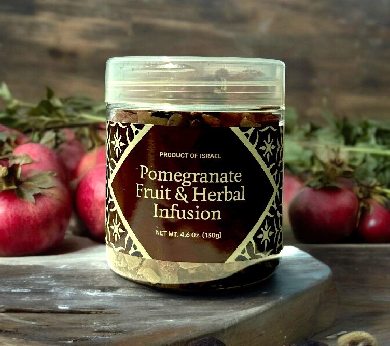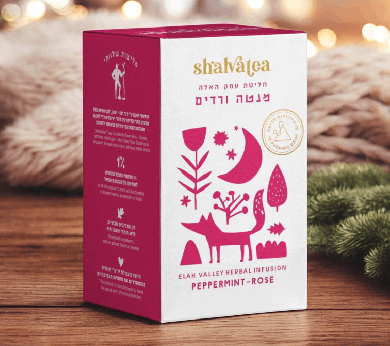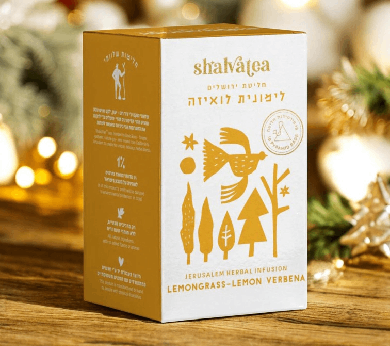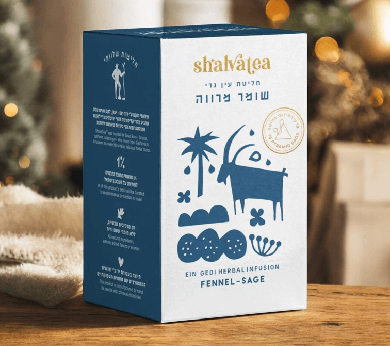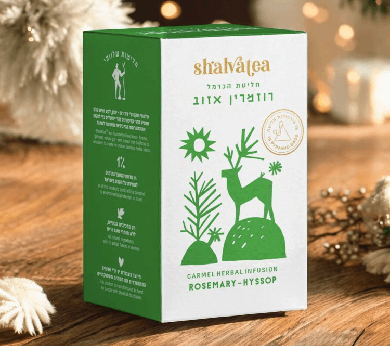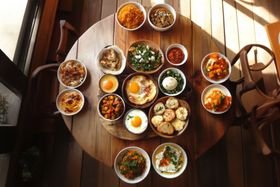5 Types of Israeli Tea: Delectable Holy Land Brews
More than just a beverage, tea in the Holy Land is a tradition steeped in history and faith. Explore the flavors of Israeli tea and embark on a spiritual journey through the land of the Bible.
Updated January 22, 2025.
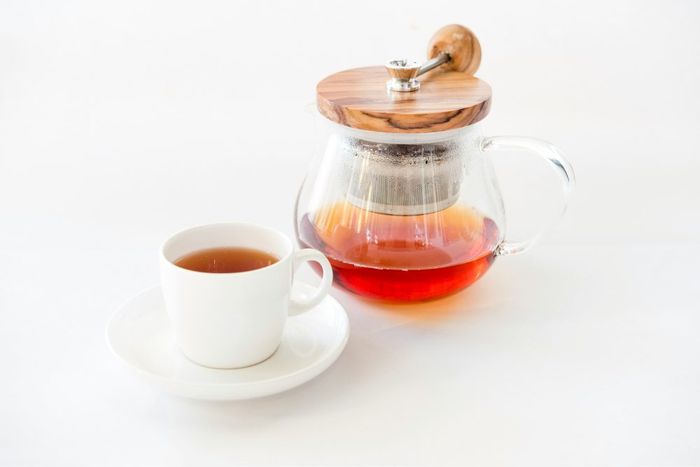
Picture this: you're strolling through the bustling Mahane Yehuda Market in Jerusalem, the air thick with the aroma of spices, fresh challah, and… something else.
A warm, comforting fragrance wafts from a nearby stall, drawing you in like a moth to a flame. You find yourself surrounded by jars and tins filled with mysterious dried leaves, flowers, and spices.
Are all these vibrant, flavorful concoctions truly considered "tea" in the traditional sense? To unravel this aromatic mystery, we must delve into the fascinating world of Israeli tea culture.
» Discover unique gourmet gifts and get a taste of the Holy Land
What Makes Israeli Tea Unique?
- Herbal infusions: Instead of using traditional tea leaves, Israelis favor herbal infusions called "halitot." These blends use native herbs like spearmint, lemon verbena, sage, and lemongrass.
- Sweet and creamy: Often influenced by Middle Eastern traditions, Israeli tea is frequently enjoyed sweet and sometimes with cream. This creates a rich, dessert-like drink, showcasing the country's diverse culinary heritage.
- Fresh herbs: It's common in Israel to use fresh herbs, especially spearmint ("nana"), steeped in hot water. This makes a refreshing drink and highlights the importance of fresh ingredients in Israeli cuisine.
» Craving more Israeli flavors? Spice up your life with Israeli seasonings
5 Best Tea From Israel
1. Pomergranate Infused Tea
This tea, made with dried pomegranate arils, often includes apple or hibiscus for a sweet and tart flavor. Pomegranates are a symbol of Israel's agricultural heritage, grown mainly in the Galilee region and the Hula Valley where the fertile soil and temperate climate produce flavorful and nutritious fruit.
To make this tea, simply steep the dried arils in hot water for 5-7 minutes. For a stronger flavor, lightly crush them beforehand. Adding honey or cinnamon while brewing creates a warm, complex taste, perfect for winter.
Pomegranate tea is deeply rooted in Israeli culture. The pomegranate is one of the Seven Species of Israel mentioned in the Bible, symbolizing righteousness and abundance.
This tea also pairs with sweet treats like almond cookies or date-filled pastries, as its sweetness complements their nutty and caramel flavors.
» Explore more Israeli cuisine! Learn to make authentic shawarma
2. Peppermint and Rose Tea
Peppermint and rose tea blends dried peppermint leaves and rose petals. A common herb in Israel, people often grow it in home gardens or source it from the Galilee region, known for its fertile soil and fragrant herbs.
To make this tea, simply steep the dried peppermint and rose petals in hot water for 5-7 minutes. For a brighter flavor, add a few sprigs of fresh mint. To enhance relaxation, some Israelis add a drop of honey and a splash of orange blossom water, creating a soothing blend perfect for evenings.
This tea reflects Israel's tradition of using fresh, local herbs. Peppermint, a staple of Middle Eastern hospitality, is often served to guests as a welcoming gesture. Rose petals, associated with fragrant gardens and traditional remedies, evoke the region's focus on natural wellness.
This tea pairs well with light, buttery biscuits or sesame seed cookies (kichel), complementing their sweetness and nuttiness. It's also delicious with fresh fruit like figs or dates, which enhance the tea's natural flavors.
» From tea to tahini! Learn to make incredible hummus
3. Lemongrass and Lemon Verbena Tea
This tea combines lemongrass and lemon verbena, two herbs known for their refreshing citrus flavors. Lemongrass grows well in Israel's warm south, while lemon verbena thrives in cooler northern areas like the Galilee. Both are staples in Israeli traditions, valued for their versatility and refreshing taste.
To make this tea, steep fresh or dried lemongrass and lemon verbena in boiling water for 5-7 minutes. For an extra refreshing drink, chill the tea and add a slice of lemon or a sprig of mint. A drizzle of honey or a few ice cubes make it a perfect summer beverage.
This tea reflects Israel's Mediterranean climate, where citrus flavors are common in food and drinks. Lemongrass and lemon verbena have been used in traditional remedies for generations, highlighting the importance of natural wellness in the region.
You can pair lemongrass tea with light salads like tabbouleh or cucumber and tomato salad. The citrusy flavors enhance the freshness of the dishes. It also complements baklavas by balancing the sweetness with acidity.
» Discover the types of dishes that make up a traditional Israeli breakfast
4. Fennel and Dandelion Tea
Fennel seeds and dandelion, either the leaves or roots, are the key ingredients in this unique tea. The aromatic fennel seeds thrive in the dry climate of the Negev region where they are widely cultivated. Dandelion, on the other hand, grows freely across Israel, a hardy herb commonly found in fields and rural areas.
To brew this tea, simply steep the crushed fennel seeds and dried dandelion in hot water for 8-10 minutes to extract their full flavor and benefits. If you prefer a richer, nuttier taste, lightly roasting the dandelion root beforehand is a common practice. You can also add a touch of honey or a squeeze of lemon to enhance the tea's flavor and boost its nutritional value.
Drinking this tea connects you to Israel's rich history of using native plants for medicinal purposes, a tradition that dates back centuries. Both fennel and dandelion are integral to traditional Middle Eastern and Mediterranean remedies, valued for their ability to promote health and vitality.
The earthy and slightly sweet notes of this tea make it a wonderful companion to savory dishes. It balances the robust flavors of meals like lentil soup or za'atar bread. It's also a lovely complement to lighter fare such as fresh vegetable crudités, enhancing their natural flavors.
» Explore Israel's vibrant street food scene! Discover must-try dishes
5. Zootah and Hyssop Tea
In the heart of Israel's Carmel Mountains grow two special herbs, zootah (white savory) and hyssop (za'atar), which together create this unique tea. Zootah brings a bold, earthy flavor, while hyssop adds a fragrant, herbal aroma. Often gathered from wild or cultivated plants, these ingredients reflect the region's rich botanical heritage.
Traditionally, this tea is brewed by steeping the dried herbs in boiling water for 7-10 minutes. But for those seeking a truly special experience, try adding a small amount of olive oil to the brew to enhance its depth and aroma. A pinch of sumac or a few sprigs of fresh thyme can also be added, amplifying the tea's energizing properties and distinctive flavor.
With each sip, this tea evokes a deep connection to Israel's land and ancient traditions. For centuries, both zootah and hyssop have played important roles in Middle Eastern cuisine and medicine.
Hyssop, in particular, holds a place in biblical texts as a symbol of purification and healing. The tea's bold flavors and robust aroma capture the essence of Israel's Mediterranean flora and its vibrant cultural heritage.
This tea is a delightful companion to a variety of foods. Its herbal notes beautifully complement savory dishes like za'atar bread and labneh drizzled with olive oil, enhancing their tanginess and richness. It also pairs wonderfully with a light breakfast of fresh vegetables and hard-boiled eggs, adding a refreshing touch to the start of the day.
» Complete your meal! Learn to make classic Israeli salad
Easy Ways to Make Israeli Tea at Home
Peppermint and Lemon Tea
- What You Need: Fresh mint leaves (or dried peppermint tea bags) and lemon slices.
- How To Make It: Steep the mint leaves in hot water, then add a slice of lemon or a squeeze of lemon juice.
- Why It Works: Peppermint has a similar refreshing taste to the "nana" herb used in Israel, and lemon adds a citrusy flavor like lemon verbena.
Dried Fruit Tea
- What You Need: Dried apple slices, raisins, and a pinch of cinnamon.
- How To Make It: Steep the dried fruits and cinnamon in hot water for 7-10 minutes. Add honey if you like it sweet.
- Why it Works: Dried pomegranates are traditional in Israel, but dried apples and raisins also create a fruity and naturally sweet tea.
» Bake like an Israeli! Get our recipe for homemade bread with a twist
A Tea Journey Through the Holy Land
From the ubiquitous nana mint tea, enjoyed for its refreshing simplicity, to the fragrant and flavorful herbal infusions like za'atar and lemongrass, there's a perfect Israeli tea for every palate and occasion.
Whether you're seeking a soothing caffeine-free brew or a stimulating black tea with a twist, exploring the world of Israeli tea is a journey for the senses that will leave you refreshed and invigorated.
So next time you're looking for a unique and flavorful tea experience, be sure to delve into the delectable world of Holy Land brews.



